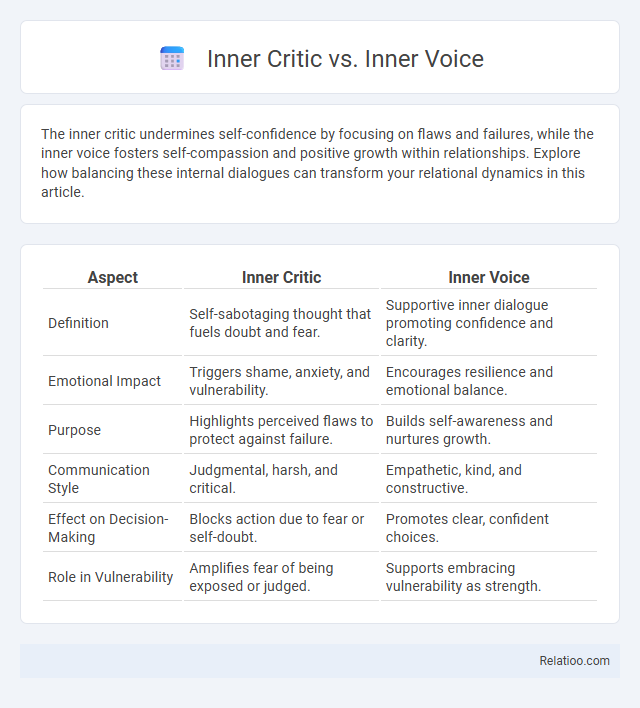The inner critic undermines self-confidence by focusing on flaws and failures, while the inner voice fosters self-compassion and positive growth within relationships. Explore how balancing these internal dialogues can transform your relational dynamics in this article.
Table of Comparison
| Aspect | Inner Critic | Inner Voice |
|---|---|---|
| Definition | Self-sabotaging thought that fuels doubt and fear. | Supportive inner dialogue promoting confidence and clarity. |
| Emotional Impact | Triggers shame, anxiety, and vulnerability. | Encourages resilience and emotional balance. |
| Purpose | Highlights perceived flaws to protect against failure. | Builds self-awareness and nurtures growth. |
| Communication Style | Judgmental, harsh, and critical. | Empathetic, kind, and constructive. |
| Effect on Decision-Making | Blocks action due to fear or self-doubt. | Promotes clear, confident choices. |
| Role in Vulnerability | Amplifies fear of being exposed or judged. | Supports embracing vulnerability as strength. |
Understanding the Inner Critic: Origins and Impact
The inner critic originates from early life experiences and internalized external judgments, often rooted in parental or societal expectations, shaping self-doubt and negative self-talk. It impacts mental health by fostering anxiety, reducing self-esteem, and hindering personal growth through persistent self-criticism. Differentiating the inner critic from the inner voice is crucial; while the inner voice provides constructive guidance and self-reflection, the inner critic undermines confidence with harsh, limiting messages.
The Role of the Inner Voice: Guidance and Intuition
The inner voice serves as a vital source of guidance and intuition, helping you navigate decisions and challenges with clarity and confidence. Unlike the inner critic, which tends to focus on self-judgment and doubt, the inner voice offers constructive insights that align with your core values and goals. Learning to distinguish and trust your inner voice can enhance self-awareness and promote emotional well-being.
Key Differences: Inner Critic vs. Inner Voice
The inner critic often manifests as a harsh, judgmental voice that undermines your confidence and self-worth, whereas the inner voice provides constructive guidance and supports positive self-reflection. Key differences between the inner critic and inner voice include tone, intent, and impact: the inner critic generates negativity and doubt, while the inner voice encourages growth and clarity. Understanding these distinctions helps you harness your inner voice to foster resilience and self-compassion.
Recognizing the Signs of Your Inner Critic
The inner critic often manifests through persistent self-doubt, harsh judgments, and negative self-talk that undermines confidence and motivation. Recognizing signs such as perfectionism, fear of failure, and excessive self-criticism helps distinguish the inner critic from the inner voice, which offers constructive guidance and encouragement. Awareness of these patterns enables individuals to consciously challenge limiting thoughts and cultivate a more supportive inner dialogue.
Harnessing the Power of Your Inner Voice
Your inner voice serves as a guiding force, offering clarity and encouragement, while the inner critic tends to be judgmental and self-limiting. Harnessing the power of your inner voice enables you to counteract negative self-talk and cultivate self-compassion and confidence. Developing awareness of these internal dialogues can lead to improved decision-making and emotional resilience.
Psychological Effects: Negative Self-Talk vs. Encouraging Self-Talk
The inner critic generates negative self-talk that undermines self-esteem and fuels anxiety, often leading to diminished motivation and heightened stress levels. In contrast, the inner voice facilitates encouraging self-talk, promoting resilience, confidence, and a healthier psychological state by reinforcing positive beliefs and adaptive behaviors. Effective management of the inner critic versus nurturing the inner voice can significantly influence emotional well-being and cognitive performance.
Strategies to Quiet the Inner Critic
Strategies to quiet the inner critic include mindfulness practices that increase self-awareness and reduce negative self-talk, cognitive-behavioral techniques that challenge and reframe irrational thoughts, and self-compassion exercises that foster a kinder inner voice. Engaging in journaling to identify critical patterns and affirming positive qualities can help differentiate the harsh inner critic from the supportive inner voice. Consistent application of these methods strengthens resilience against self-criticism and promotes mental well-being.
Techniques to Strengthen the Inner Voice
Strengthening the inner voice involves practicing self-compassion, positive affirmations, and mindfulness to create a supportive mental environment that counters the harshness of the inner critic. Techniques such as journaling, cognitive restructuring, and visualization help reframe negative self-talk, promoting constructive and empowering internal dialogue. Consistent engagement in these methods enhances emotional resilience, self-awareness, and confidence, fostering a balanced inner voice that guides personal growth.
Transforming Self-Doubt Into Self-Compassion
Your inner critic often triggers self-doubt by highlighting perceived flaws, while your inner voice nurtures self-awareness and growth. Transforming self-doubt into self-compassion involves consciously shifting focus from harsh judgment to supportive, encouraging thoughts. This process enhances emotional resilience and fosters a healthier, more balanced self-perception.
Embracing Self-Awareness for Personal Growth
Your inner critic often highlights doubts and fears, whereas your inner voice reflects your authentic thoughts and feelings, both playing crucial roles in self-awareness. Embracing self-awareness requires recognizing the distinctions between these inner dialogues to foster personal growth and emotional resilience. Understanding and managing your inner critic versus inner voice can transform negative self-talk into empowering insights that support your development.

Infographic: Inner critic vs Inner voice
 relatioo.com
relatioo.com